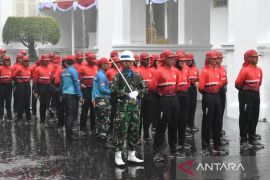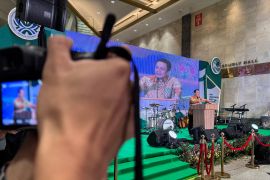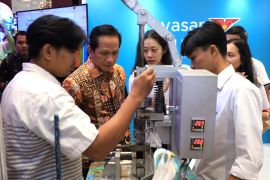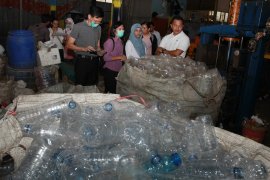The theme for this year`s World Environment Day celebrations, which is Think.Eat.Save, is an anti-food waste and food loss campaign that encourages every one to reduce his or her foodprint.Jakarta (ANTARA News) - Joining the international community in observing the World Environment Day, which falls on June 5, Indonesia`s Environmental Affairs Ministry organized a discussion on Clean Up Indonesia Movement (GIB) recently.
The discussion revealed that Jakarta alone produces at least 56 cubic meters of waste in every two days. "So, every two days Jakarta builds garbage as big as the structure of Borobudur Temple," Sodiq Suhardianto, the head of the Indonesian Waste Study Center (PKPI), told the audience. The large of the famous Buddhist temple is 52 cubic meters.
To help address the waste problem, the government has launched the Clean Up Indonesia Movement which was initiated by President Susilo Bambang Yudhoyono and its implementation is headed by Vice President Boediono.
The movement which was officially launched on November 12, 2012, has involved 22 ministries and other related institutions such as the Indonesian Military and Police.
Director of the United Nations Information Center (UNIC) office in Jakarta Michele Zaccheo, another speaker in the discussion, on the occasion cited an example of clean up movement in Bulgaria. Around 350,000 volunteers took part in the activity and managed to collect 100,000 tons of garbage within five hours.
"The activity was to observe the World Environment Day on June 5. In fact, we should make every day as Environment Day," Zaccheo said in the discussion which was part of a series of activities organized by the environmental affairs ministry to observe the World Environment Day this year.
Earlier, the ministry organized the Indonesian Environment Week (PLI) at the Jakarta Convention Center from May 30 to June 2, 2013.
Officially opened by Environmental Affairs Minister Balthasar Kambuaya, the 17th Indonesian Environment Week was highlighted with a number of activities such as environment discussion, green music festival, painting contest and eco-driving.
The event was themed "Change Consumption Behavior To Save the Environment", which is relevant to the World Environment Day`s theme, namely "Think. Eat. Save".
Ilyas Asaad, chairman of the event`s organizing committee, said the theme of the PLI 2013 was adjusted to that of the World Environment Day since food is the future challenge of all mankind.
The rising population has raised food needs and therefore, people must change their consumptive behavior so as not to cause food waste, he said.
"At this PLI we apply a concept of `zero waste. When this event winds up we will count how much garbage has been produced," he said.
The theme for this year`s World Environment Day celebrations, which is Think.Eat.Save, is an anti-food waste and food loss campaign that encourages every one to reduce his or her foodprint.
According to the UN Food and Agriculture Organization (FAO), every year 1.3 billion tonnes of food is wasted. This is equivalent to the same amount produced in the whole of sub-Saharan Africa. At the same time, one in every seven people in the world go to bed hungry and more than 20,000 children under the age of five die daily from hunger.
Given this enormous imbalance in lifestyles and the resultant devastating effects on the environment, this year`s theme - Think.Eat.Save - encourages every person to become more aware of the environmental impact of the food choices he or she makes and empowers him or her to make informed decisions.
The World Environment Day celebration began in 1972 and has grown to become one of the main vehicles through which the United Nations stimulates worldwide awareness of the environment and encourages political attention and action.
In Indonesia, the peak event of the World Environment Day is usually led by President Susilo Bambang Yudhoyono at the presidential palace where he will present Kalpataru (Tree of Life) awards to Indonesia environmental heroes and Adipura awards to cities considered successful in maintaining cleanliness.
Globally, the World Environment Day`s main event is hosted by the Mongolian government and focuses on the new UN Environment Programme (UNEP) and UN Food and Agricultural Organization (FAO) campaign - Think.Eat.Save.
As part of the celebrations, UNEP and partners including the World Resources Institute and the International Fund for Agricultural
Development launched two reports: one presenting a menu of solutions to reduce food waste and loss, and one highlighting how smallholder farmers have the potential to lift one billion people out of poverty given the right support and enabling conditions.
Mongolia has been chosen to host the international event because Mongolia is one of the fastest-growing countries in the world, and is aiming to ensure this growth goes hand in hand with a green economy and civilization.
While Mongolia does not waste significant food, the traditional nomadic lifestyle of some of its people, who developed ways to preserve food for long periods, offers some ancient answers to the modern-day challenge of food waste, the UNEP said on its official website.
In response to Indonesian journalist`s question in Ulanbaatar, Mongolia, UNEP Executive Director Achim Steiner on June 3, 2013, praised President Susilo Bambang Yudhoyono for Indonesia`s commitment to the greenhouse gas emission cut to help address the climate change during the Copenhagen conference in Denmark in 2009.
While other countries were still reluctant to support the target achievement in accordance with the required standard, President Yudhoyono immediately expressed the commitment, Steiner said at a press conference.
The press conference in Mongolia`s capital city was organized following the opening of National Forum on Green Development held in conjunction with the World Environment Day.(*)
Reporter: Fardah
Editor: Heru Purwanto
Copyright © ANTARA 2013










